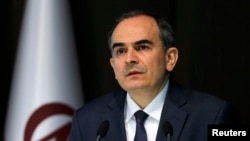The continuing dispute between Turkey's president and the Central Bank chief has hit hard hit the country's economy hard. Observers warn that the threat of financial turmoil is unlikely to let up as the June general election draws near.
Prime Minister Ahmet Davutoglu has promised to intervene to restore order to financial markets after the Turkish lira repeatedly broke record lows, causing heavy losses on the stock market.
The turmoil is a result of President Recep Tayyip Erdogan repeatedly criticizing Central Bank Chief Erdem Basci for failing to aggressively cut interest rates.
But Erdogan now says he will meet with Basci and his key supporter, Deputy Prime Minister Ali Babacan. Analyst Atilla Yesilada of Global Source Partners said international financial markets will be watching the meeting.
"Today we have seen the currency come down a bit and the stock market appreciate, which I think investors are betting that a positive conclusion to the summit and I hope they are right," he said. "But I am afraid if they are wrong we will see an earthquake in the markets."
The president's economic advisers continue to argue aggressive interest rate cuts are needed to kick-start the economy before June’s general election. But central bank chief Basci refuses to cut the rates because inflation remains above the bank’s target, threatening Turkey's international credit.
Erdogan has suggested the central bank chief's failure to cut interest rates is part of an international conspiracy, which he called "the interest rate lobby." The president blamed it for being behind nationwide anti-government protests in 2013.
Last week, Prime Minister Davutoglu met with top U.S. investors in New York to try to calm investor sentiment.
But analyst Yesilada said the prime minister did little to restore market confidence, given the wide-held belief that the president is the one who really wields power in Turkey.
"There really [is] no certainty that Davutoglu had a handle on the affairs or that he would have the final word when he came back to Turkey," said Yesilada. "The entire economy team has a creditability problem."
Analysts said that despite the prime minister's New York visit, U.S. based Citibank sold its shares in a Turkish bank at a loss of $800 million, sending a powerful negative message.
Istanbul based Finans Bank Chief Economist Inan Demir said some people remain prepared to invest in Turkey, but at a price.
"The investor character will be more short term, more opportunistic type of investors, rather than buy and hold investors who can stick to their positions long term," he said.
While these incidents do not cut off investment, Demir said "they are bound to change the nature of the investment flows."
"And further interventions in that way are bound to undermine [the] central bank's credibility further, increasing the premium Turkey needs to pay just to keep Turkish lira stable," he said.
Mindful of the growing economic cost and potential political costs, Deputy Prime Minister Bulent Arinc has defended the central bank.
"I do not think it is right to say to the central bank, 'You are acting incorrectly,' going outside legal boundaries and intervening in their duties," Arinc said.
He suggested that perhaps the president should only provide advice.









